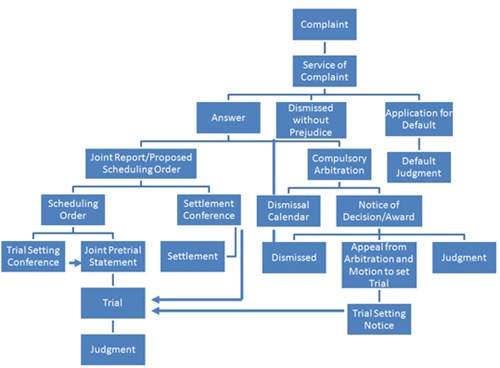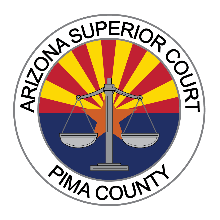
HOW A CIVIL CASE PROCEEDS
ARS – Arizona Revised Statutes
ARCivP – Arizona Rules of Civil Procedure
PCLR – Pima County Local Rules (found in the Arizona Rules of Civil Procedure)
FASTAR – Fast Trial and Alternative Resolution Program
COMMENCEMENT OF ACTION (ARCivP 3; PCLR 2.12)
The following paperwork is filed to initiate the action:
The Complaint (initiating pleading) is filed at the civil desk with Clerk of the Court, if a self-represented litigant, (1st floor of the courthouse) or electronically filed, if an attorney, setting forth the allegations against defendants and relief sought. NOTE: A self-represented litigant has the option to sign up with AZTurboCourt and file electronically utilizing the instructions for Pima County.
A Civil Case Cover Sheet must be completed, indicating all plaintiffs and defendants.
A filing fee must accompany the Complaint
A judicial officer may waive or delay the payment of filing fees under certain extraordinary circumstances.
If all of the above are not submitted at the same time with the Complaint, the Clerk’s Office will not accept the matter for filing.
FASTAR Certificate (Word)
SERVICE OF SUMMONS AND COMPLAINT (ARCivR 4)
Service of the Complaint and Summons must then be made upon defendant(s). This is the responsibility of the filing party, not the Court.
The Summons sets forth the period of time in which the defendant(s) must file a response in the form of an Answer.
Upon completion of service, an Affidavit of Service is filed with the Clerk’s Office (Civil) or electronically filed setting forth the date, time and place of service.
If service of process has not been made within 90 days (or 60 if a FASTAR case) from the filing of the Complaint, a notice is sent to plaintiff(s) that service must be completed in 30 days of all unserved defendant(s).
If service is not made within 120 days of the filing of the Summons and Complaint, the case is administratively dismissed by the Court requiring no further notification to plaintiff(s).
ANSWER TO COMPLAINT (ARCivP 12(a))
An Answer responding to the allegations set forth in the Complaint must be filed within the time requirements (see Summons; refer to rules) and if it is a FASTAR case, must be accompanied by a FASTAR Controverting Certificate (FASTAR Rule 102(b) (Word)
Defendant will be required to file an answer fee at the time of filing the Answer.
FORM OF PLEADING; SIGNING OF PLEADINGS, MOTIONS AND OTHER PAPERS (ARCivP 10 and 11 and PCLR 2)
Be mindful of the above rules when submitting paperwork to the Court.
DISCOVERY PHASE (ARCivP 33 – 37)
Once the Complaint has been answered by defendant(s):Both sides define the facts and issues of the case through “discovery”:
interrogatories (written questions and answers);
depositions (recorded testimony under oath);
request for admissions; and
requests for production of documentary and/or physical evidence.
Motions shall be filed with the Clerk’s Office (if a self-represented litigant) or electronically via AZTurboCourt (if filer is an attorney). REMEMBER: Once a matter has been served and the parties have answered, copies of all subsequent filings must be provided to the assigned judicial officer and all other parties in the action.
The motions should be filed soon enough to be disposed of at least 30 days before trial. EXCEPTIONS: Motions to Dismiss and Motions for Summary Judgment must be filed no later than 90 days (or 60 days if a FASTAR case) prior to trial. (Refer to the rules or court orders for specific deadlines.)
Either party may request a hearing of a motion by submitting a Notice of Hearing to the assigned judicial officer and a date and time for the hearing will be assigned.
If no hearing is requested, the assigned judicial officer will decide the motion without benefit of a hearing and solely upon the motion [referred to as an “M-Book Ruling” and response(s) and/or reply(ies) to the motion, if any filed, upon expiration of the times for filing response(s) and/or reply(ies).
IF NO ANSWER IS FILED (ARCivP 55)
If the time to answer has passed (refer to rules), plaintiff shall file a request for default judgment for the relief requested in the Complaint in an effort to resolve the action as to the defaulted party(ies). If a request is not filed, a default will not be entered.
A default judgment is accomplished by plaintiff(s) filing:
An Application for Default/Entry of Default and Motion for Default Judgment must be filed and proper notice given to party against whom the default is to be taken.
If a motion for default judgment without hearing is filed, it will be handled by the assigned judicial officer.
If a motion for default judgment with hearing is filed, a default hearing shall be scheduled once the effective date of default has passed (refer to the rules).
If a default hearing is to be scheduled before the hearing officer, please refer to Hearing Officer’s Court Proceedings for further information.



